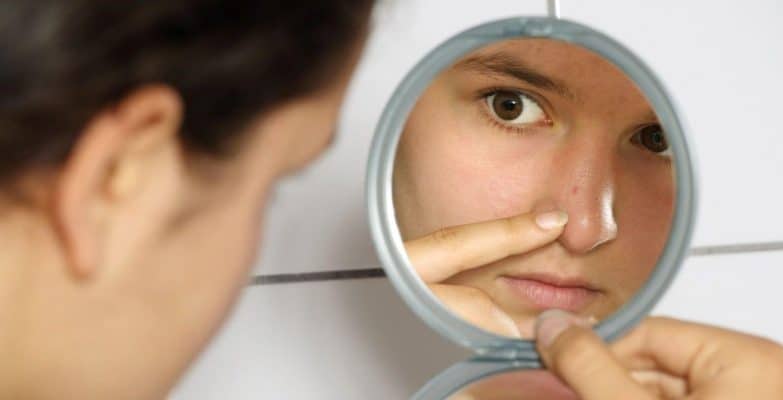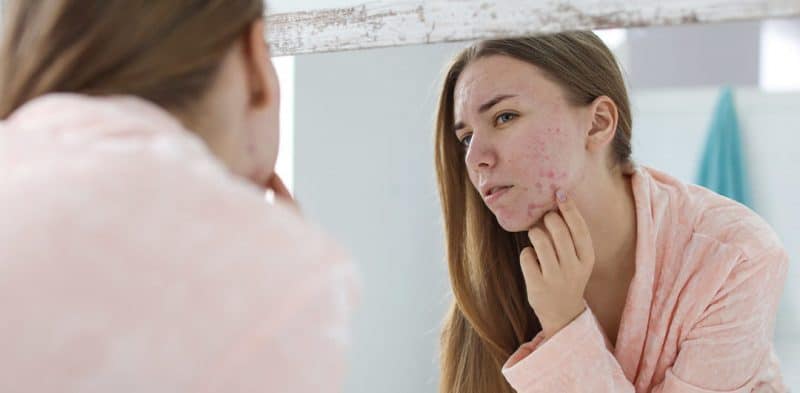
What causes acne is still one of the burning questions in dermatology. Some factors have been established as being very common causes such as hormones, bacteria, and genetics. Hormones in particular seem to produce the largest number of inflammatory conditions, which then leads to an increase in acne production. Hormone disorders can include hormonal imbalances or endocrine problems including thyroid dysfunction and adrenal hyper-plasia, but the main causes seem to be the following:
Bacteria, yeast, and viral infections are also considered to be causes, though their relative frequency is usually much lower than those that are attributed to hormones. Bacteria can be caused by many different strains including the propionibacterium acne and acne vulgaris species. Yeasts are commonly associated with diabetes, glandular problems, and other endocrine disorders.
Viral infections are generally considered to be brought on by a few different viruses. A few examples include herpes and staph, as well as the common cold or the flu. The most common viral infection brought on by hormones is acne. However, some other conditions can cause the same symptoms.
Recurring breakouts can be caused by anything from excess sebum production, excessive skin shedding, decreased lymphatic drainage or imbalanced hormones. These conditions will typically affect areas of the skin that is thicker than normal. Blemishes will then appear and spread from the point of origin until they reach the surface of the skin. This process can take a very long time; therefore, it is common for acne to come and go rather than just stay in one place for prolonged periods of time.
What causes recurring acne? As previously mentioned, there are a number of potential factors, which could be associated with causing the condition. The more common conditions tend to involve the skin shedding. For example, folliculitis or “pustules” could develop. This is the inflammation of hair follicles; and is almost always associated with increased hormonal levels.

Some of the other conditions that can contribute to acne include follicular hypertension and follicular maceration. High blood pressure can make the follicles more sensitive to hormone levels. Maceration is the accumulation of fat beneath the skin, and this may account for some of the problems associated with acne. While these conditions do not always lead to acne, they may aggravate existing conditions.
What causes back acne? Usually, when the skin goes through excessive dryness, it will trigger an overproduction of oil. This can then lead to the development of acne, as the excess oils cause irritation or blockage to your pores. Common locations for back acne include the back of the neck, the shoulders, the buttocks and upper thighs. It can also become a chronic condition, and it tends to reoccur after some time.
If you are looking for a permanent cure, it is best to stick with treatments that attack the condition from the inside. This means using skin care products that can address the issues from the inside out. With what causes back acne treatment, it is usually best to use a natural approach that can help improve your overall health, as well as clear up your acne problems. There are many holistic solutions available today, and they have been proven to be effective and safe for treating acne.
The best solutions to the question of what causes recurring acne are skin care products that contain anti-bacterial ingredients. The best overnight spot treatment for acne are anti-bacterial and also help calm the skin. These can be used to help acne in conjunction with an oily-meant ingredient called Capuacu butter. Capuacu butter helps moisturize and protect the skin from environmental irritants such as cold weather, pollution, dust and dirt.
What causes back acne is also why it is so difficult to treat once you have developed a problem. In order to completely clear up an acne breakout, you need to address the underlying reasons for its development. For many people suffering from constant breakouts, it is important to treat the acne at the root cause, which may be hormonal imbalance or stress. You must also be diligent about keeping the skin clean, as dirt, grime and makeup can contribute to an acne breakout.
If you find yourself asking what causes recurring acne? There are several factors that may be contributing to your breakouts. It’s important to rule out lifestyle choices that are contributing to the problem by eliminating these. If you need help, there are several good over the counter back acne treatment products available. You just need to determine which one works best for your type of acne.
